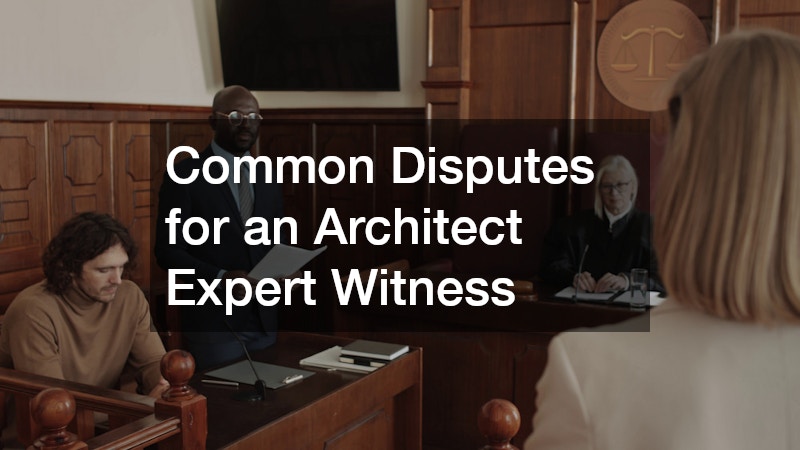
This article explores common disputes that architects face when serving as expert witnesses. Understanding these disputes is crucial for architects who are asked to offer expert testimony in legal settings. By analyzing typical conflicts like construction defects, contractual disputes, and professional negligence, architects can prepare themselves better for their expert witness roles.
Understanding Construction Defects
Types of Construction Defects
Construction defects can be categorized into several types, including design deficiencies, material deficiencies, and construction process failures. Design deficiencies, often revealed as issues like inadequate structural support, require architects to scrutinize blueprints and design plans meticulously.
Construction defects reported to insurance companies can result in costly repairs, necessitating accurate evaluations from expert witnesses.
Material deficiencies may involve the use of substandard or inappropriate building materials, which can compromise the integrity of a structure. These defects might become apparent only after substantial completion, leading to disputes that require architectural insight to determine accountability. The implications of such defects can be severe, ranging from increased maintenance costs to safety hazards.
Construction process failures occur due to improper installation or non-compliance with design specifications. Architects as expert witnesses must evaluate construction procedures to determine whether they align with industry standards. Testifying about these defects involves presenting clear explanations of how deviations from the design impacted the final structure.
Role of the Architect Expert Witness
An architect expert witness plays a pivotal role in cases concerning construction defects by providing objective, expert knowledge. They serve both the court and the parties involved by breaking down complex architectural issues into understandable concepts. This often involves reviewing project documents, inspecting construction sites, and providing opinions based on their expertise.
Architects assess compliance with building codes and standards and evaluate the adequacy of design and construction decisions. Their testimony can help determine the origin of a defect, whether due to design errors, material issues, or construction practices. This assessment is crucial in assigning liability and considering potential remediation solutions.
Challenges may arise from contested expert opinions, requiring the architect to defend their assessments rigorously. They must be well-versed in legal procedures and adept at communicating technical information clearly and concisely. Effective testimony from architect expert witnesses can significantly influence the case outcomes by clarifying technical disputes and providing informed recommendations.
Challenges in Construction Defect Cases
Handling cases involving construction defects poses several challenges, notably in balancing impartiality with effective advocacy. Architects must maintain credibility while presenting opinions that might conflict with those of other experts or stakeholders. The intricate nature of construction processes can lead to disputes over the defect’s causes and impacts, complicating the case further.
The vast array of construction practices and standards necessitates a deep and comprehensive understanding of industry norms. Architect expert witnesses must be prepared to navigate disputes over code interpretations or industry best practices, highlighting their ability to demonstrate both technical and practical knowledge. Furthermore, they must accurately assess and explain the impact of defects on the building’s usability and safety.
Time pressures in legal proceedings can also add strain, requiring quick yet thorough evaluations and responses. Effective communication skills are essential, as architects must translate their technical assessments into language that judges, juries, and attorneys can understand. Their ability to handle cross-examinations confidently and withstand scrutiny is pivotal in upholding the validity of their expert opinions.
Contractual Disputes
Common Contractual Issues
Contractual disputes in architecture frequently arise from misunderstandings or ambiguities in contracts. Common issues include disagreements over the scope of work, timelines, and interpretation of contract terms. Architects often have to confront claims related to delays, cost overruns, or deviations from project specifications.
These disputes require a comprehensive understanding of contractual language and an ability to identify the implications of vague or conflicting terms. Architects serving as expert witnesses analyze contract documents to determine the intent and obligations of each party. Their insights can clarify misunderstandings and reveal whether contractual breaches occurred.
Resolving these issues is crucial, as unresolved disputes can lead to project delays and increased legal costs. Moreover, architects may need to offer perspective on industry norms and standard practices, which can serve as a benchmark in resolving disagreements. Their expertise aids in disambiguating the terms and ensuring a fair assessment of compliance.
Interpreting Contract Terms
Interpreting contract terms is a critical function of an architect expert witness, especially when those terms are ambiguous or open to various interpretations. By examining the intent and context of contract wording, architects help elucidate obligations and expectations. This role is vital in disputes where contract provisions are the focal point of arguments.
Architects are tasked with dissecting complex contractual clauses to ascertain responsibilities and verify adherence to specifications. Their testimony often involves providing context about industry standards and explaining how specific terms should be applied in practice. This requires a meticulous approach to analyzing project documentation, reports, and contractual correspondence.
In many cases, the architect’s interpretation could be pivotal in determining the outcomes of disputes, potentially influencing the resolution process positively. Their ability to convey the complexities of contract language persuasively and clearly to legal audiences is paramount. This expertise contributes significantly to attaining a fair and informed case resolution.
Understanding these common disputes is vital for architect expert witnesses. Mastery of the complexities involved in construction defects, contractual disputes, and professional negligence can significantly impact the outcomes of legal proceedings. As trusted experts, architects play an essential part in navigating these disputes, offering clarity, informed testimony, and strategic resolutions that benefit all parties involved.
